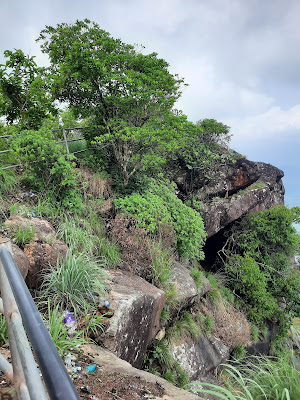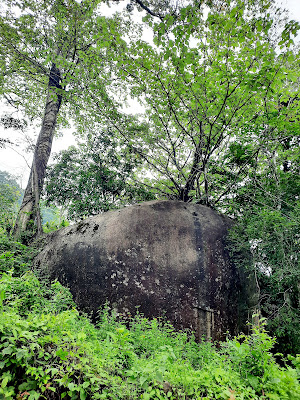Kattadikadavu: forbidden tourist place
How about walking into a forbidden forest? Welcome to Kattadikadavu in the district of Idukki in Kerala. The following prohibition welcomes you quite majestically.
There is a well-trodden path lying ahead beckoning you, especially if you are a lover of forests and mountains. And this is India where signboards don't mean anything much. You choose to follow the trail which soon becomes a concrete path assuring you that you are not on any illegal land. The signboard must be about some forest lying somewhere ahead. You are a good citizen and you decide not to enter that forest. You will abide by the path strictly. Go on.
The concrete path will end soon. You are now walking on boulders. And the climb is quite stiff. Go on. It's good for health. And the forest is beckoning you seductively. Somewhere ahead lies the forbidden forest, which you won't enter because you are a good citizen. You will only watch it from the cliff ahead.
You are a good citizen. You won't enter forbidden lands. You love the forests and mountains. Keep climbing. Look at both sides to enjoy the beauty of nature. It's not forest that you see on either side but lands tamed by human efforts. There is cultivation everywhere. Plantains, jack fruit trees, coffee bushes, rubber... You're sure it's not forest. Go on.
Some two kilometres up the trail, you suddenly land on a plateau with a highly humanised version of the mountain landscape. You notice that there is a house. A woman emerges from that house. She is sizing you up. Are you a threat? That's what she is assessing. She soon understands that you are just another loafer. But she wants to make sure. "Don't stay on the cliff if there's lightning," she counsels you. You realise that it is cloudy and remember that the met department had warned of rains in the afternoon. You thank the woman and walk on, not without appreciating the elegant walkway to her house.
The human touch on the trail ends soon. The trail tapers off and becomes hardly navigable.
Have you entered the forbidden forest? You're not sure. There's no signboard anywhere to warn you of anything. No fences, no barriers - you go on. And you reach the summit. Look around and enjoy the beauty of the landscape.
You see the clouds gathering in the sky and remember the warning given by the woman on the way. So you decide to descend. It's like descending from heaven. But you have no choice but descend. Heavens are never permanent. Our destiny is certainly not so paradisiacal. The mundane world with all its ennui is where we belong whether you like it or not.
Back on the highway, you walk to a wayside shop - just a rare one - for a lemonade. "Why is there a signboard warning against entering this place?" You ask the shopkeeper. You are not sure whether you have tresspassed. Did you enter a forest at all? Is the hill a privte property except the topmost portion which has no human touch other than the footfalls of some wayward traveller like you? What does that signboard mean to say?
"Our government is anti-people, isn't it?" The shopkeeper spits out a question. He tells me that there were a few families living there but they have all left because of government interference. "There's just one family still left there." I remember the woman who gave me a friendly warning. The lightning she mentiones acquired a metaphorical meaning now.
When I reach home I give a call to one of the two phone numbers on the signboard. The man talks typically like a government employee in India. Rudely. Crudely. You can't enter Kattadikadavu, he tells me bluntly. No reasons. He thinks I am his eternal enemy. Every government employee in India thinks the same, I know - that all citizens are their enemies.
I Google for more information on Kattadikadavu and understand that some people encroached on the forest land and the forest department is trying to retrieve that forest. The encroachers seem to be quite powerful people because the litigation is going on now for many years. The woman I met on the way is just a maid of the encroacher. The wayside shopkeeper is another Indian trying to eke out a livelihood from the tourist potential of Kattadkikdavu.
What will be the future of Kattadikadavu as far as tourists are concerned? I am left wondering. Maybe, tourists will keep climbing in spite of the forbidding signboard at the threshold. This is India, after all. We know how to manage situations according to our own conveniences.
PS. When we reached the nearest town, we had lunch. It started raining heavily though there was no lightning. I remembered the woman in Kattadikadavu. Her warning was not entirely metaphorical.










Hari OM
ReplyDeleteWell, a mystery - or an enigma? - as to rights of entry. I for one am glad that you over-rode your obedience gene and went a-wandering, because those images are gorgeous! YAM xx
Encroachment of forests is quite common in India. Even the government does it in the name of development. The spiritual body called RSSB does it in the name of spirituality. Big shots do it with impunity.
DeleteHey, you're very brave, would I have dared tredding along that inhospitable place, not that I cannot appreciate the beauty. 😀
ReplyDeleteIt was a tough climb. My wife and niece were with me. We loved the walk.
DeleteWould love to go hiking there!
ReplyDeleteIt's a lovely place. I hope it won't be shut down.
DeleteLooks like a lush place to take a walk.
ReplyDeleteCoffee is on, and stay safe.
It's a hill and the walk is arduous.
DeleteYes, encroachment is a major problem. It's the result of the danger mix of power and politics. So much of precious land has been lost already. Hope there is an end to it, and some of it at least can be recovered. Looks like a beautiful place,
ReplyDeleteOur politicians are the most immoral people in the country, I think. That's why there's so much corruption everywhere. A lot of forests in North India are now the private property of a few crony capitalists.
DeleteA thought provoking post peppered with philosophical musings like "Heavens are never permanent."
ReplyDeleteLove the photos and the satirical flavour of the 'good citizen' and the 'forbidden forest.'
Sharing a blog post I read earlier today which talks about land encroachments in India: https://josna.wordpress.com/2023/04/07/530-no-elephants-crossing/
That link does make good reading. Thank you.
Delete